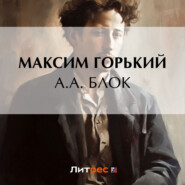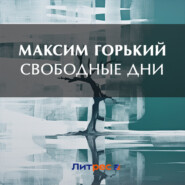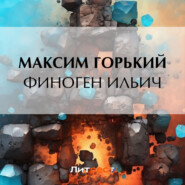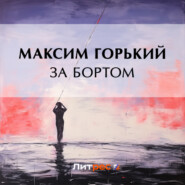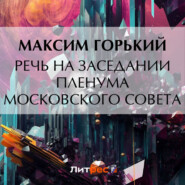По всем вопросам обращайтесь на: info@litportal.ru
(©) 2003-2025.
✖
Mother
Настройки чтения
Размер шрифта
Высота строк
Поля
Unconscious of the bearing of the thing, the mother's gaze was riveted on Rybin. He said something; she heard his voice, but the words did not reach the dark emptiness of her heart.
She recovered her senses, and took a deep breath. A peasant with a broad light beard was standing at the steps looking fixedly into her face with his blue eyes. Coughing and rubbing her throat with her hands, weak with fear, she asked him with an effort:
"What's the matter?"
"Well, look." The peasant turned away. Another peasant came up to her side.
"Oh, thief! How horrible you look!" shouted a woman's voice.
The policemen stepped in front of the crowd, which increased in size. Rybin's voice sounded thick:
"Peasants, I'm not a thief; I don't steal; I don't set things on fire. I only fight against falsehood. That's why they seized me. Have you heard of the true books in which the truth is written about our peasant life? Well, it's because of these writings that I suffer. It's I who distributed them among the people."
The crowd surrounded Rybin more closely. His voice steadied the mother.
"Did you hear?" said a peasant in a low voice, nudging a blue-eyed neighbor, who did not answer but raised his head and again looked into the mother's face. The other peasant also looked at her. He was younger than he of the blue eyes, with a dark, sparse beard, and a lean freckled face. Then both of them turned away to the side of the steps.
"They're afraid," the mother involuntarily noted. Her attention grew keener. From the elevation of the stoop she clearly saw the dark face of Rybin, distinguished the hot gleam of his eyes. She wanted that he, too, should see her, and raised herself on tiptoe and craned her neck.
The people looked at him sullenly, distrustfully, and were silent. Only in the rear of the crowd subdued conversation was heard.
"Peasants!" said Rybin aloud, in a peculiar full voice. "Believe these papers! I shall now, perhaps, get death on account of them. The authorities beat me, they tortured me, they wanted to find out from where I got them, and they're going to beat me more. For in these writings the truth is laid down. An honest world and the truth ought to be dearer to us than bread. That's what I say."
"Why is he doing this?" softly exclaimed one of the peasants near the steps. He of the blue eyes answered:
"Now it's all the same. He won't escape death, anyhow. And a man can't die twice."
The sergeant suddenly appeared on the steps of the town hall, roaring in a drunken voice:
"What is this crowd? Who's the fellow speaking?"
Suddenly precipitating himself down the steps, he seized Rybin by the hair, and pulled his head backward and forward. "Is it you speaking, you damned scoundrel? Is it you?"
The crowd, giving way, still maintained silence. The mother, in impotent grief, bowed her head; one of the peasants sighed. Rybin spoke again:
"There! Look, good people!"
"Silence!" and the sergeant struck his face.
Rybin reeled.
"They bind a man's hands and then torment him, and do with him whatever they please."
"Policemen, take him! Disperse, people!" The sergeant, jumping and swinging in front of Rybin, struck him in his face, breast, and stomach.
"Don't beat him!" some one shouted dully.
"Why do you beat him?" another voice upheld the first.
"Lazy, good-for-nothing beast!"
"Come!" said the blue-eyed peasant, motioning with his head; and without hastening, the two walked toward the town hall, accompanied by a kind look from the mother. She sighed with relief. The sergeant again ran heavily up the steps, and shaking his fists in menace, bawled from his height vehemently:
"Bring him here, officers, I say! I say – "
"Don't!" a strong voice resounded in the crowd, and the mother knew it came from the blue-eyed peasant. "Boys! don't permit it! They'll take him in there and beat him to death, and then they'll say we killed him. Don't permit it!"
"Peasants!" the powerful voice of Rybin roared, drowning the shouts of the sergeant. "Don't you understand your life? Don't you understand how they rob you – how they cheat you – how they drink your blood? You keep everything up; everything rests on you; you are all the power that is at the bottom of everything on earth – its whole power. And what rights have you? You have the right to starve – it's your only right!"
"He's speaking the truth, I tell you!"
Some men shouted:
"Call the commissioner of police! Where is the commissioner of police?"
"The sergeant has ridden away for him!"
"It's not our business to call the authorities!"
The noise increased as the crowd grew louder and louder.
"Speak! We won't let them beat you!"
"Officers, untie his hands!"
"No, brothers; that's not necessary!"
"Untie him!"
"Look out you don't do something you'll be sorry for!"
"I am sorry for my hands!" Rybin said evenly and resonantly, making himself heard above all the other voices. "I'll not escape, peasants. I cannot hide from my truth; it lives inside of me!"
Several men walked away from the crowd, formed different circles, and with earnest faces and shaking their heads carried on conversations. Some smiled. More and more people came running up – excited, bearing marks of having dressed quickly. They seethed like black foam about Rybin, and he rocked to and fro in their midst. Raising his hands over his head and shaking them, he called into the crowd, which responded now by loud shouts, now by silent, greedy attention, to the unfamiliar, daring words:
"Thank you, good people! Thank you! I stood up for you, for your lives!" He wiped his beard and again raised his blood-covered hand. "There's my blood! It flows for the sake of truth!"
The mother, without considering, walked down the steps, but immediately returned, since on the ground she couldn't see Mikhaïl, hidden by the close-packed crowd. Something indistinctly joyous trembled in her bosom and warmed it.
"Peasants! Keep your eyes open for those writings; read them. Don't believe the authorities and the priests when they tell you those people who carry truth to us are godless rioters. The truth travels over the earth secretly; it seeks a nest among the people. To the authorities it's like a knife in the fire. They cannot accept it. It will cut them and burn them. Truth is your good friend and a sworn enemy of the authorities – that's why it hides itself."
"That's so; he's speaking the gospel!" shouted the blue-eyed peasant.
"Ah, brother! You will perish – and soon, too!"
"Who betrayed you?"
"The priest!" said one of the police.
She recovered her senses, and took a deep breath. A peasant with a broad light beard was standing at the steps looking fixedly into her face with his blue eyes. Coughing and rubbing her throat with her hands, weak with fear, she asked him with an effort:
"What's the matter?"
"Well, look." The peasant turned away. Another peasant came up to her side.
"Oh, thief! How horrible you look!" shouted a woman's voice.
The policemen stepped in front of the crowd, which increased in size. Rybin's voice sounded thick:
"Peasants, I'm not a thief; I don't steal; I don't set things on fire. I only fight against falsehood. That's why they seized me. Have you heard of the true books in which the truth is written about our peasant life? Well, it's because of these writings that I suffer. It's I who distributed them among the people."
The crowd surrounded Rybin more closely. His voice steadied the mother.
"Did you hear?" said a peasant in a low voice, nudging a blue-eyed neighbor, who did not answer but raised his head and again looked into the mother's face. The other peasant also looked at her. He was younger than he of the blue eyes, with a dark, sparse beard, and a lean freckled face. Then both of them turned away to the side of the steps.
"They're afraid," the mother involuntarily noted. Her attention grew keener. From the elevation of the stoop she clearly saw the dark face of Rybin, distinguished the hot gleam of his eyes. She wanted that he, too, should see her, and raised herself on tiptoe and craned her neck.
The people looked at him sullenly, distrustfully, and were silent. Only in the rear of the crowd subdued conversation was heard.
"Peasants!" said Rybin aloud, in a peculiar full voice. "Believe these papers! I shall now, perhaps, get death on account of them. The authorities beat me, they tortured me, they wanted to find out from where I got them, and they're going to beat me more. For in these writings the truth is laid down. An honest world and the truth ought to be dearer to us than bread. That's what I say."
"Why is he doing this?" softly exclaimed one of the peasants near the steps. He of the blue eyes answered:
"Now it's all the same. He won't escape death, anyhow. And a man can't die twice."
The sergeant suddenly appeared on the steps of the town hall, roaring in a drunken voice:
"What is this crowd? Who's the fellow speaking?"
Suddenly precipitating himself down the steps, he seized Rybin by the hair, and pulled his head backward and forward. "Is it you speaking, you damned scoundrel? Is it you?"
The crowd, giving way, still maintained silence. The mother, in impotent grief, bowed her head; one of the peasants sighed. Rybin spoke again:
"There! Look, good people!"
"Silence!" and the sergeant struck his face.
Rybin reeled.
"They bind a man's hands and then torment him, and do with him whatever they please."
"Policemen, take him! Disperse, people!" The sergeant, jumping and swinging in front of Rybin, struck him in his face, breast, and stomach.
"Don't beat him!" some one shouted dully.
"Why do you beat him?" another voice upheld the first.
"Lazy, good-for-nothing beast!"
"Come!" said the blue-eyed peasant, motioning with his head; and without hastening, the two walked toward the town hall, accompanied by a kind look from the mother. She sighed with relief. The sergeant again ran heavily up the steps, and shaking his fists in menace, bawled from his height vehemently:
"Bring him here, officers, I say! I say – "
"Don't!" a strong voice resounded in the crowd, and the mother knew it came from the blue-eyed peasant. "Boys! don't permit it! They'll take him in there and beat him to death, and then they'll say we killed him. Don't permit it!"
"Peasants!" the powerful voice of Rybin roared, drowning the shouts of the sergeant. "Don't you understand your life? Don't you understand how they rob you – how they cheat you – how they drink your blood? You keep everything up; everything rests on you; you are all the power that is at the bottom of everything on earth – its whole power. And what rights have you? You have the right to starve – it's your only right!"
"He's speaking the truth, I tell you!"
Some men shouted:
"Call the commissioner of police! Where is the commissioner of police?"
"The sergeant has ridden away for him!"
"It's not our business to call the authorities!"
The noise increased as the crowd grew louder and louder.
"Speak! We won't let them beat you!"
"Officers, untie his hands!"
"No, brothers; that's not necessary!"
"Untie him!"
"Look out you don't do something you'll be sorry for!"
"I am sorry for my hands!" Rybin said evenly and resonantly, making himself heard above all the other voices. "I'll not escape, peasants. I cannot hide from my truth; it lives inside of me!"
Several men walked away from the crowd, formed different circles, and with earnest faces and shaking their heads carried on conversations. Some smiled. More and more people came running up – excited, bearing marks of having dressed quickly. They seethed like black foam about Rybin, and he rocked to and fro in their midst. Raising his hands over his head and shaking them, he called into the crowd, which responded now by loud shouts, now by silent, greedy attention, to the unfamiliar, daring words:
"Thank you, good people! Thank you! I stood up for you, for your lives!" He wiped his beard and again raised his blood-covered hand. "There's my blood! It flows for the sake of truth!"
The mother, without considering, walked down the steps, but immediately returned, since on the ground she couldn't see Mikhaïl, hidden by the close-packed crowd. Something indistinctly joyous trembled in her bosom and warmed it.
"Peasants! Keep your eyes open for those writings; read them. Don't believe the authorities and the priests when they tell you those people who carry truth to us are godless rioters. The truth travels over the earth secretly; it seeks a nest among the people. To the authorities it's like a knife in the fire. They cannot accept it. It will cut them and burn them. Truth is your good friend and a sworn enemy of the authorities – that's why it hides itself."
"That's so; he's speaking the gospel!" shouted the blue-eyed peasant.
"Ah, brother! You will perish – and soon, too!"
"Who betrayed you?"
"The priest!" said one of the police.












